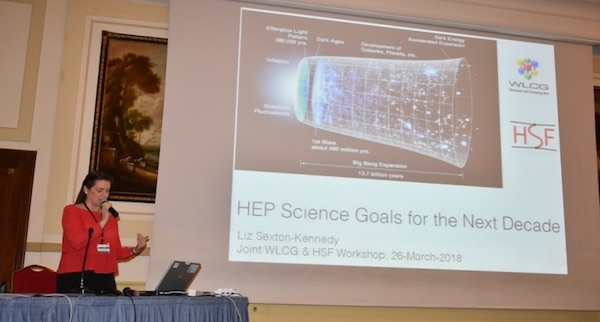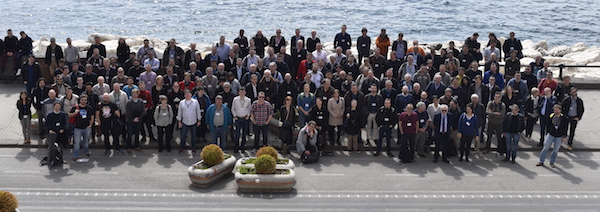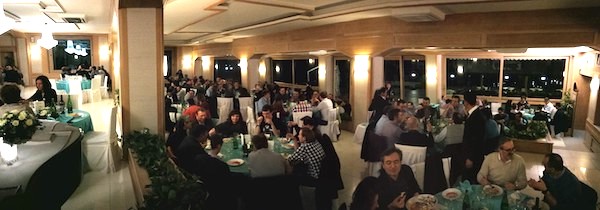WLCG-HSF Workshop in Naples
The WLCG-HSF joint workshop took place in Naples from 26-29 of March. There was a great deal of interest in the event, with 211 people registering, far exceeding the size of any workshop hosted by WLCG or HSF alone. The idea of tackling the challenges in HEP computing for the next decade in common, struck a real chord with the community.
The workshop opened with Liz Sexton-Kennedy laying out the big picture of the HEP science goals, covering the motivations that drive research in particle physics, astro-particle physics and cosmology. New facilities for the exascale era are under construction. For HL-LHC, DUNE, SKA, LIGO and LSST and we need to undertake major R&D in software and computing to ensure these programmes are a success.

Eduardo Rodrigues then reviewed the HSF Community White Paper Roadmap that was published last year and was the major driver for the workshop. He outlined each of the CWP’s chapters along with its major R&D goals and stressed again the approach of working together, re-characterising “CWP” as Community Wide Projects.
After this great introduction to the workshop, and a further review of the important technology trends and use cases, we continued with a mixture of plenary and parallel sessions that covered the major areas the community needs to invest in.
Recognising the large cost of data storage and data management for WLCG, and anticipating the data volumes of HL-LHC, optimising our storage systems is an important and challenging area for study. Consolidating storage into larger units, sometimes called a data lake, is one area to study; the anticipation is that much more use of the wide area network will be made in the future to deliver data on demand to where it is needed. Successes from the HEP programme, like the Rucio data management system could offer a broad engagement with other sciences also facing massive distributed data challenges. Later technical sessions dived into the details. There will be a strong coupling to how we can actually characterise and measure the effectiveness of our workloads on our grid infrastructures, which the two sessions of the Performance and Cost Modeling group looked at. There will be a lot of follow up to define the real R&D goals as well as the way to measure success in such a complex coupled and large-scale system. The Workload Management teams look to be involved there too as the data processing frameworks are a key actor here. Our current systems are rather diverse, but there are many shared goals.
In addition to these technical developments, using our large distributed computing systems securely and evolving how we authenticate and responding to threats was discussed in the Security session of the workshop.
The challenges of processing data in heterogeneous resource clusters were laid out at the beginning of the Frameworks and Infrastructure session, before two presentations from frameworks (ALFA and CLARA) implementing a design that addresses that very challenge. How to evolve the other frameworks used across the HEP experiments was a discussion that continued in the parallel session, where the group plans regular meetings and a follow up at CHEP. Even the tricky question of using new languages, outside our comfort zone of C++ and Python, was discussed, generating lively discussion.

In the analysis domain, where workloads are far more diverse than for organised production activities, there are many interesting developments to follow-up. Systems like SWAN have had success in bringing notebook technology to HEP analysis. The SWAN team now plans R&D to scale up to future challenges. In the meantime, data science tools like Apache Spark achieve a scale and ease of use which is admirable and our community would like to emulate, albeit that this is much harder to achieve with HEP analysis data. There was a fascinating talk and live demonstration of the Dask system for cluster based data analysis and analytics in the Python ecosystem. Improvements in Data Preservation practice might well also link into these new, easier to capture, analysis workflows.
Back at the production end of HEP, where data is taken from the detector and reconstructed, we heard about the use of FPGAs to perform surprisingly complicated reconstruction tasks in the LHCb RICH. Advances in making such devices easy to program offer the prospect of more wide-spread use of this technology in the future. Looking at other reconstruction challenges modern hardware could be used more efficiently if the right algorithms are found; that might include replacing some traditional programmed solutions with machine learning that can usually run well on wide vector registers, multiple CPU cores or even GPUs. That challenge might also be faced more effectively in common through the use of community toolkits, such as VecCore, that help code adapt to the changing hardware landscape. An intense discussion about the strategy to be used here, and how much specific HEP solutions are really required, took place and typifies many of the open questions our R&D programme needs to address.
There were two full sessions dedicated to the event simulation domain. Producing events with better underlying physics is needed for both HL-LHC and the intensity frontier programs, where accuracy of understanding rare processes is a key to success. In addition, there is a need to speed up simulation. This takes a few forms, such as better use of current hardware, tested via the GeantV R&D line, and the use of approximate techniques that reproduce complex processes more cheaply. Machine learning again looks very promising here, particularly for calorimeter simulation. Past fast simulation efforts have been very detector specific so the challenge is how to make faster techniques more generic, including the process of training networks and performing validation. The community is very active here and a vigorous and diverse R&D is underway.
Work on event displays, a key part of Visualisation in HEP saw interest in consolidation and starting common projects to share best practice and ideas.
The Software Development session reviewed progress made by the HSF’s Packaging Working Group. A common solution here will be of great benefit to our R&D projects in the future as it will allow a wider base of users to more easily test early releases. A decision was also made to consolidate information and best practice on performance monitoring and tooling, which will help developers across the field.
Helping establish best practice for development is one part of the training challenge our community faces. Ensuring that our software is well written and tested is a key part of making code more sustainable for experiments with multi-decade lifetimes. The training session gathered speakers involved in many of the community’s training areas, in experiments and from dedicated schools, and there was discussion about the best way to address the needs in the future. Agreeing that a solid base was the best place to start, the group will try and ensure that as many basic training needs are satisfied in common. Contributions to training should be recognised as a part of the career profile of our developers, but long term career prospects remain a concern, as with many other areas in HEP.

Opening the final session of the workshop was a talk from Anna Scaife from the Square Kilometre Array Telescope and AENEAS projects. This is one of the other sciences facing a data deluge in the future and there can be a very healthy relationship with HEP, which has been recognised in the establishment of an MoU with CERN and WLCG.
That set the scene for conveners reviewing their sessions and pointing the way to the R&D which is needed in the next years. Common projects for development and plans were presented. There is much still to define and a lot of work that we still need to do, but the workshop was a great step forward. Feedback from the attendees highlighted the success of the event, particularly in the way that it brought the software and computing communities together to encourage useful discussion and fruitful interaction.
Overall the workshop was a great success and there is clearly enthusiasm for repeating it. That will be the next community wide checkpoint for our software upgrade R&Ds.